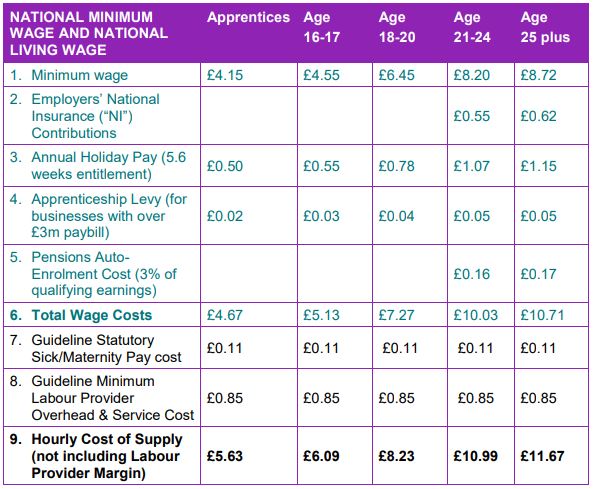Are you paying a fair price for your security?


The Security Industry in the UK has a reputation for poor wages and in many cases individuals are not earning above minimum wage.
This blog looks at fair pricing policies to ensure that appropriate wages are being paid and analyses some of the immoral and illegal practices that are being used to keep charge rates artificially low in the industry.
Our aim with this blog is to highlight to potential security buyers the responsibilities of ensuring they pay a fair rate and ensure that their security providers are meeting legal minimum standards when it comes to paying their staff.

It is easy to forget that when opting to buy security, you aren’t just paying the hourly rate for security officers. There are numerous outgoings which security providers must allow for.
For example employers must pay legal minimum wage to all employees – as of 1st April 2020, this is £8.72 per hour for employees aged 25 or over. Employers must also pay National Insurance contributions, holiday pay, pensions, allowance for statutory sick pay and maternity and paternity pay.
Employers must also fund staff training, uniform and overheads – such as rent and utilities. If a security provider offers a Mobile Patrol service, they will have fleet vehicles, which means they must allow for the cost of petrol, insurance and the general upkeep of equipment or assets.
Taking into account all of the factors and costs involved with security, it is hard to comprehend how businesses can offer a low rate, yet still cover the statutory payments, as well as internal costs. If a security provider is offering you security services at a ‘special rate’ which is barely over the national minimum wage, it is unlikely that they will be able to cover the other basic outgoings.
It is not uncommon to hear security companies offering to provide services for a low rate, so it is important to be informed and keep an eye out for red flags. The Gangmasters & Labour Abuse Authority (GLAA) have published guidance on charge rates and what they suggest is the very basic minimum charge rate.

This guidance suggests that the Hourly Cost of Supply (not including Labour Provider Margin) for employees aged 25 or over is £11.67 per hour. If a security provider is promoting a charge rate below this figure, this should be cause for concern.
If a security provider informs you that they can supply an officer for £10 per hour , they could not possibly be paying for all the contributions and overhead, as well as paying minimum wage for the employee. With minimum wage being £8.72 per hour, a charge rate of £10 per hour would not leave enough for the company to cover costs. If they are offering a low charge rate, it is possible that the company would have no insurance cover or might be using self-employed staff. Although this is not illegal, you might want to make sure there are procedures in place for the vetting of self-employed staff and what insurance cover is in place for them to undertake their duties.
It is worth bearing all of this in mind when choosing a security provider – although some businesses may charge more than others, it is more likely their staff have had proper in-depth training, which will mean you will receive a better service and that the business is paying all of its statutory contributions and abiding by all legal requirements.
A reputable company should be willing to provide you with a breakdown of how they reach their specified charge rates.
For more information on charge rates and a breakdown of costs, it is worth visiting the website for The Gangmasters & Labour Abuse Authority.
